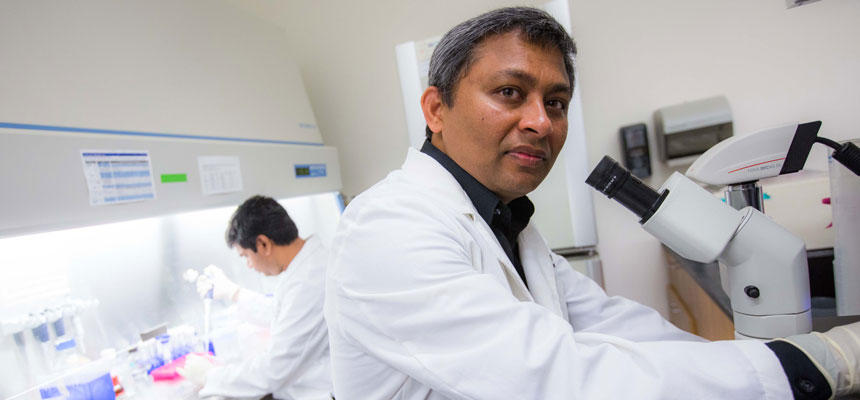UNTHSC gets $1.5 million to study possible glaucoma treatment
By Jan Jarvis
First, Gulab Zode, PhD, and his team of researchers discovered how a gene that causes glaucoma leads to the pathology in the eye. Then they found a drug to treat and cure a rare form of the blinding eye disease.
Now that same drug could one day be used to treat open angle glaucoma, the most common form of the disease.
Previous studies showed that the drug sodium-phenybutyrate plays an important role in reducing the elevated pressure that causes glaucoma, said Dr. Zode, Associate Professor of Pharmacology & Neuroscience.
“What we hope to show is that this drug can be used to not only treat a rare form of glaucoma, but cure all forms of the disease,” Dr. Zode said.
Dr. Zode recently received a $1.5 million grant from National Eye Institute to study how the drug can be used as a targeted treatment for open angle glaucoma. For many years, patients with glaucoma have been treated with drugs that reduce intraocular pressure but the actual cause of the disease has never been addressed.
If this drug proves effective, it could open the door to a cure for the second leading cause of irreversible blindness. The drug has been shown to be effective for the genetic form of the disease that affects about 2 million people under the age of 40 worldwide. But it is now being studied as a treatment for the more than 64 million people in the world who have open angle glaucoma.
In previous studies, researchers at the North Texas Eye Research Institute were able to eliminate myocilin, a protein involved in both juvenile and adult-onset open-angle glaucoma, and lower intraocular pressure to prevent further damage to the eye.
Using the drug sodium 4-phenybutyrate, it is possible to target the ER stress pathway and correct the damage caused by glaucoma, Dr. Zode said.
“None of the treatments so far target the pathology of the disease,” he said. “But this drug can target the pathway that causes the damage to the eye.”
The Food and Drug Administration has already approved the drug for urea cycle disorders, a hereditary metabolic condition caused by a deficiency of one of the enzymes in the urea cycle responsible for removing ammonia from the bloodstream.
“Our goal is to take the studies being done now and take them to a clinic to be tested in patients,” Dr. Zode said.

![Uyen Sa Nguyen Scaled[58]](https://www.unthsc.edu/newsroom/wp-content/uploads/sites/16/Uyen-Sa-Nguyen-scaled58-145x175.jpg)




Social media